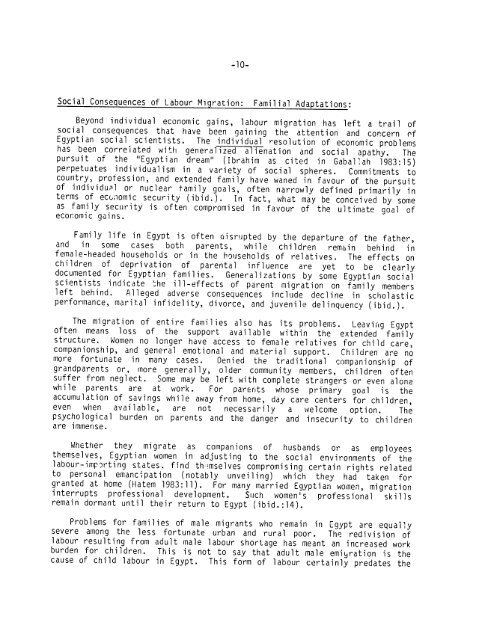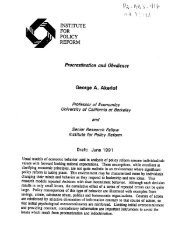FAMILIAL ADAPTATIONS TO THE INTERNATIONALIZATION OF ...
FAMILIAL ADAPTATIONS TO THE INTERNATIONALIZATION OF ...
FAMILIAL ADAPTATIONS TO THE INTERNATIONALIZATION OF ...
You also want an ePaper? Increase the reach of your titles
YUMPU automatically turns print PDFs into web optimized ePapers that Google loves.
-10-<br />
Social Consequences of Labour Migration: Familial Adaptations:<br />
Beyond individual economic gains, lahour migration has left a trail of<br />
social consequences that have been gaining the attention and concern of<br />
Egyptian social scientists. The individual resolution of economic problems<br />
has been correlated with generalized alienation and social apathy. The<br />
pursuit of the "Egyptian dream" (Ibrahim as cited in Gabal'ah 1983:15)<br />
perpetuates individualism in a variety of social spheres. Commitments to<br />
country, profession, and extended family have waned in favour of the pursuit<br />
of individual or nuclear family goals, often narrowly defined primarily in<br />
terms of ecunomic security (ibid.). In fact, what may be conceived by some<br />
as family security is often compromised in favour of the ultimate goal of<br />
economic gains.<br />
Family life in Egypt is often oisrupted by the departure of the father,<br />
and in some cases both parents, while children remain behind in<br />
female-headed households or in the households of relatives. The effects on<br />
children of deprivation of parental influence are yet to be clearly<br />
documented for Egyptian families. Generalizations by some Egyptian social<br />
scientists indicate the ill-effects of parent migration on family members<br />
left behind. Alleged adverse consequences include decline in scholastic<br />
performance, marital infidelity, divorce, and juvenile delinquency (ibid.).<br />
The migration of entire families also has its problems. Leaving Egypt<br />
often means loss of the support available within the extended family<br />
structure. Women no longer have access to female relatives for child care,<br />
companionship, and general emotional and material support. Children are no<br />
more fortunate in many cases. Denied the traditional companionship of<br />
grandparents or, more generally, older community members, children often<br />
suffer from neglect. Some may be left with complete strangers or even alone<br />
while parents are at work. For parents whose primary goal is the<br />
accumulation of savings while away from home, day care centers for children,<br />
even when available, are not necessarily a welcome option. The<br />
psychological burden on parents and the danger and insecurity to children<br />
are immense.<br />
Whether they migrate as companions of husbands or as employees<br />
themselves, Egyptian women in adjusting to the social environments of the<br />
labour-imparting states, find thlmselves compromising certain rights related<br />
to personal emancipation (notably unveiling) which they had taken for<br />
granted at home (Hatem 1983:11). For many married Egyptian women, migration<br />
interrupts professional development. Such women's professional skills<br />
remain dormant until their return to Egypt (ibid.:14).<br />
Problems for families of male migrants who remain in Egypt are equally<br />
severe among the less fortunate urban and rural poor. The redivision of<br />
labour resulting from adult male labour shortage has meant an increased work<br />
burden for children. This is not to say that adult male emigration is the<br />
cause of child labour in Egypt. This form of labour certainly predates the
















